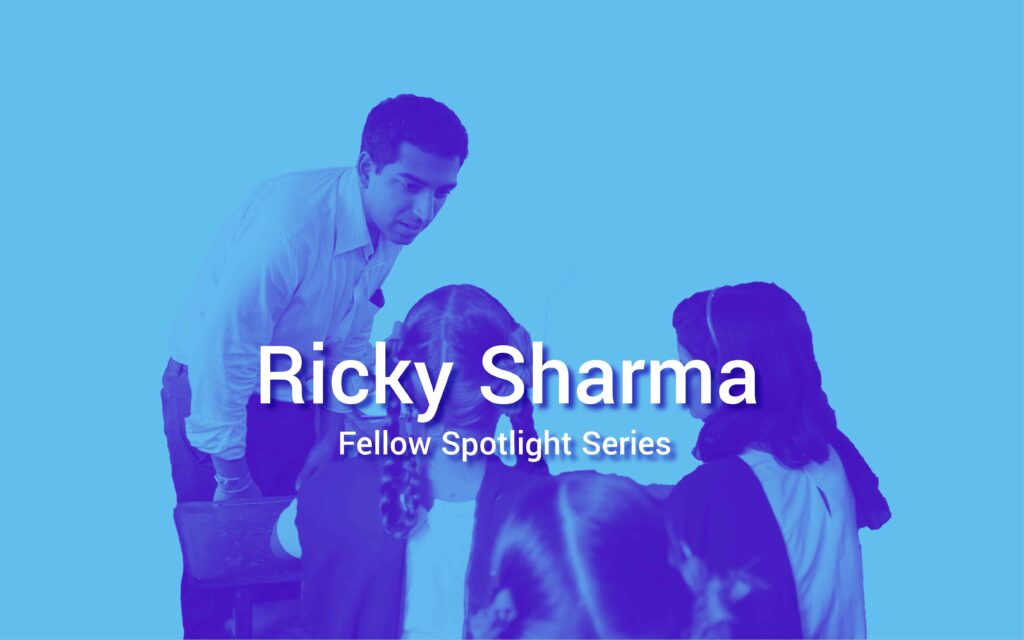Ensuring a healthy transition from childhood to adulthood for the 120 million adolescent girls living in India today is a formidable challenge. Studies show that at least half of the girls in India are anemic, twice the rate of their male counterparts. One out of every four girls in the country drops out of school after she begins menstruating, and 30 percent of women will become victims of physical or sexual abuse during their lives. Ricky Sharma (MPP ’18, Cheng Fellow) and his spouse, Dr. Priya Shankar, recently decided to dedicate their efforts to this issue by launching Girls Health Champions, a cost-effective, evidence-based model that has the potential to influence lasting change for Indian girls and their families.
Deeply familiar with India through intimate family ties, the idea for Girls Health Champions came to Sharma and Shankar after years of researching, teaching, and volunteering in the country. From the onset, the founding pair knew they wanted to focus on improving outcomes for girls because of the significant gender gaps present in the country’s health burdens. They decided to focus on adolescent girls after realizing global health initiatives primarily serve maternal health and children ages zero to five, leaving out the critical juncture between the two stages. Sharma recalled, “We saw this incredible unmet need of adolescents, who are transforming into adults with very little support or education on how to make that transition successfully.”
When Girls Health Champions launched, Sharma used his background in finance to focus on the organization’s business and operational model. His wife and co-founder Shankar, a pediatrician with a public health degree from Harvard, used medically-sound research to guide the design of the curriculum of the program. It focuses on nutrition, gender-based violence, mental health, menstruation, reproductive health, and pregnancy. Sharma said, “Priya and I make a good team because our backgrounds and skills complement each other. We definitely have our different areas of expertise and collaborate well together.”
“We saw this incredible unmet need of adolescents, who are transforming into adults with very little support or education on how to make that transition successfully.”
Girls Health Champions received major honors in Harvard University’s President’s Innovation Challenge after a successful pilot of the program at a school in India, but Sharma wanted to continue to increase his ability to affect positive social change. “I’m grateful for my time in the private sector because I gained a solid skillset and had a wide variety of experiences that I know will help me build this organization, but I knew I wasn’t done learning. I came to HKS to figure out how to use my business experience and develop new competencies to be part of positive change in the public and nonprofit sectors.”
The couple has been deliberate in shaping the role the organization can and should play in the Indian context. Sharma explained that they decided early on to embrace a local implementation model to reach girls. “We partner with NGOs that are on the ground like Niramaya Health Foundation. They have access to the schools and have formed key relationships. A lot of the staff implementing our program are from and work in the communities we serve. We provide the model, the curriculum, and training, then we collaborate in implementing it.”
Part of the program’s potential for widespread impact is its peer-to-peer design, which empowers the girls to continue the work by taking it beyond the scheduled school gatherings. Once a girl completes the curriculum, she can elect to be a peer educator, or in this case a Champion. By sharing her knowledge and training with other girls, her family, and her community, the influence of Girls Health Champions becomes exponential with just a modest initial investment. Currently, 400 of the over 1,500 girls who have completed the program are Champions.
The founders rely on assessments that track participants’ progress in a number of areas: knowledge gains, social attitudes, leadership dispositions, and health behaviors. Sharma explained, “Being evidence based and measuring and demonstrating our impact is something that Priya and I take very seriously. We pride ourselves on trying to do the right thing in a meaningful way. We started at one school and always sought to measure the progress of girls in the program.”
Sharma knew the peer-to-peer model was powerful and cost effective, but, during the kick-off retreat with the SICI team, he realized the importance of always continuing to develop the programming of his organization. Participating in an activity called the Theater of the Oppressed, Sharma and other Cheng Fellows role-played a scene that a girl served by Girls Health Champions might experience at home. Sharma said, “The SICI advisors used creative approaches to make me step back from our work and think about the assumptions I was making. The activity reinforced that gender inequality was a common theme across these health issues, and I appreciated that if we are ever going to affect large-scale change, men have to be involved. Men perpetrate the vast majority of violence against women, and they have to be a part of changing social dynamics to overcome gender inequality. We want to make sure we galvanize all of the intergenerational stakeholders to be collaborators and supporters of the work that we are doing.”
He and Priya now have plans to include young men in future organizational programming. Girls Health Champions is seeking more partnerships with existing NGOs, schools, and eventually governments. The program currently has multiple interns from the Harvard T.H. Chan School of Public Health and University of California, San Francisco, and, soon, they plan to begin hiring staff and building their team in India. “The SICI advisors helped me strategize how to grow the program and bring on talent to build an effective team. This work is delicate and tricky at times, but it is all about supporting people to fill their capacities and leverage their talents toward a common goal.”
“Men perpetrate the vast majority of violence against women, and they have to be a part of changing social dynamics to overcome gender inequality. We want to make sure we galvanize all of the intergenerational stakeholders to be collaborators and supporters of the work that we are doing.”
As for his time as a Cheng Fellow, Sharma said, “The experience gave us the resources and space to think through our model so that it can be scalable and make a large impact. The fellowship is a tremendous opportunity to take an idea, concept, or fledgling organization and stress test it, think through many different dimensions and angles, and develop a program or approach at the end of the year that is ready to move forward. The SICI community also gave me the conviction that our program had legs, and we needed to continue advancing it. I left the program with a lot of confidence in the work we are doing and excited for our future.”
Want to connect with Girls Health Champions? Follow them on Facebook or send an email!

